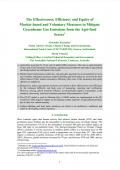
This report focuses on the risks of climate change to development in Sub-Saharan Africa, South East Asia and South Asia. Building on the 2012 report, Turn Down the Heat: Why a 4°C Warmer World Must be Avoided, this new scientific analysis examines the likely impacts of present day, 2°C and 4°C warming on agricultural production, water resources, and coastal vulnerability for affected populations. It finds many significant climate and development impacts are already being felt in some regions, and in some cases multiple threats of increasing extreme heat waves, sea level rise, more severe storms, droughts and floods are expected to have further severe negative implications for the poorest. Climate related extreme events could push households below the poverty trap threshold. High temperature extremes appear likely to affect yields of rice, wheat, maize and other important crops, adversely affecting food security. Promoting economic growth and the eradication of poverty and inequality will thus be an increasingly challenging task under future climate change.
The private sector is increasingly being engaged in climate finance and climate-related activities. Private sector opportunities for engagement in climate change adaptation are less clear than for mitigation, particularly in developing countries. This article first conceptualizes private sector engagement in adaptation by exploring: (1) different roles of the private sector in adaptation in developing countries; and (2) the way governments can create an enabling environment to increase private sector engagement. Second, it analyses how 47 least developed countries (LDCs) envisage the role of the private sector in their National Adaptation Programmes of Action (NAPAs). This article argues that private sector engagement in adaptation is often inevitable and potentially significant. Yet, the results show that it receives little attention in NAPAs.
Guide dealing with the process of measuring the carbon footprint of products along the value chain, known as Product Carbon Footprints (PCFs), in the agri-food sector - provides an introduction to (PCF); outlines various types of PCF schemes and initiatives; describes steps involved in calculating PCFs, illustrating each step through case study examples; presents methodological issues and problems in calculating PCFs with a focus on data, uncertainty and issues particularly relevant to developing countries; gives an overview of potential mitigation measures; appendices include links to relevant websites, a glossary of related terms, and a list of frequently asked questions.
This summary was prepared by Eldis.

Agriculture accounts for 13 per cent of global GHG emissions. This rises to approximately 30 per cent if land clearance for farming, agrochemical production and trade in agricultural and food products are attributed to the sector. Market based mechanisms (carbon tax, cap and trade, payment for environmental services) and voluntary mitigation measures (carbon labelling and food miles) are reviewed for their effectiveness (if they reduce emissions), efficiency (the costs of the measures) and equity (fairness to suppliers). Measures to reduce agricultural emissions are limited in their effectiveness and efficiency by the technical difficulty and high costs of measuring, reporting and verification. However, pricing carbon would be effective in internalizing negative externalities in the transport, processing, retail and consumer purchase and preparation of food. The Global Trade Analysis Project (GTAP) model is used to illustrate that a US$ 40 carbon tax implemented in the EU would have little negative impact on developing country exporters of agricultural products due to their low carbon intensity.
This book outlines the Republic of Korea’s goals for green growth, including its green growth strategy, legislation and plans. Commercialization of green technologies is highlighted as a key platform for economic growth and job creation. The book was initially published in January 2011 in Korean under the title, “The Right Way to Know about Green Growth” with the support of the Republic of Korea Presidential Committee on Green Growth.
